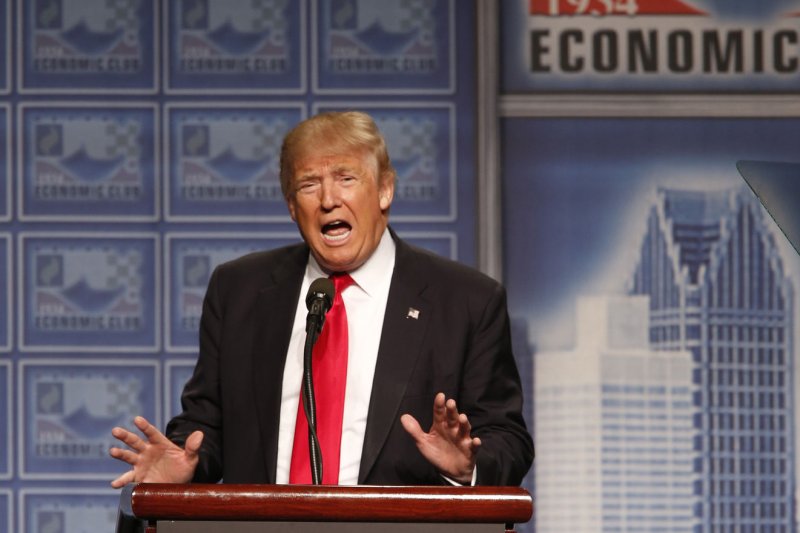1 of 2 | Republican U.S presidential nominee Donald Trump addresses the Detroit Economic Club where he introduced his economic plan in Detroit, Michigan, August 9, 2016. Photo by Rebecca Cook/UPI |
License Photo
WASHINGTON, Aug. 10 (UPI) -- Donald Trump and Hillary Clinton have both signaled their agreement to do three debates leading up to the Nov. 8 presidential election.
The debate schedule briefly drew Trump's ire because two of the debates will be broadcast opposite prime time NFL games, potentially diminishing the audience size, though on Tuesday, Trump agreed to the proposal by the nonpartisan Commission on Presidential Debates.
The schedule and format are as follows:
-- Monday, Sept. 26 at Hofstra University on Long Island, where the debate will feature six 15-minute segments on varying topics selected by the moderator. Each candidate will have two minutes to respond to a question and then the opportunity to engage one another in a broader debate on the topic, as governed by the moderator.
-- Sunday, Oct. 9 at Washington University in St. Louis, where a town hall-style format will be used. Half the questions will be from members of the audience and half will be from the moderator.
-- Wednesday, Oct. 19, at the University of Nevada, Las Vegas, where the same format as the first debate will be used.
Additionally, a single vice presidential debate has been scheduled on Tuesday, Oct. 4 in Farmville, Va.
The first debate appears opposite a Monday Night Football game on ESPN between the Atlanta Falcons and New Orleans Saints. The second debate airs opposite the national Sunday Night Football game between the New York Giants and Green Bay Packers.
The debate commission said it was aware of the conflicts, but that attempting to schedule around potential television and sports broadcast schedule conflicts was impossible.
While Trump agreed in principle on Tuesday, a day prior he told Time magazine his participation could be contingent on the commission selecting moderators he deemed "fair."
"I'll have to see who the moderators are. Yeah, I would say that certain moderators would be unacceptable, absolutely," Trump said. "I did very well in the debates on the primaries. According to the polls, I won all of them. So I look forward to the debates. But, yeah, I want to have fair moderators ... I will demand fair moderators."
In 2012, CNN reporter Candy Crowley drew criticism from Mitt Romney supporters after she inserted herself into an exchange between Romney and President Barack Obama, pointing out a factual inaccuracy on Romney's part, which some said helped Obama.
The commission sets broad guidelines for how moderators conduct the debates. They have sole responsibility for drafting questions and the general authority to ensure both candidates are given equal time to speak, but there are no specific rules pertaining to when or how they should interject themselves into the substance of the back-and-forth between the candidates.
"The moderators will have the ability both to extend the segments and to ensure that the candidates have equal speaking time," the commission's proposal states. "While the focus will properly be on the candidates, the moderator will regulate the conversation so that thoughtful and substantive exchanges occur."















